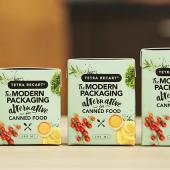Common thread. How we were, how we are

La storia siamo noi, (We are history) sang Francesco De Gregori. History is a catalogue of facts, of actions performed by human beings, and not abstract dates and concepts. History is told; it is repeated: to understand the sense of events, of the feelings and ideas of those that made it, in order perceive reality with awareness.
History is, however, also fascination, as the Imballaggio magazine’s “semi-serious autobiography” successfully demonstrates in its simplicity, written at the time* to put down in black and white what had been and what could not have been otherwise. And which today, not without some surprise, seems to me to be still very relevant. I’ll let you be the judge!
«In a period in which there are people willing to do anything to talk about themselves, why, I said to myself - I being a magazine - shouldn't I also give an account of myself? After all, mine, in fact, is not just any old story. I was created in April in 1950 in a very lively and industrious Milan of the time, fully intent on rebuilding and developing. […]
At that time, technical publishing was still to be invented, if only because an authentic packaging technology and industry was only just taking shape. It was therefore a question of setting up an instrument that was able to follow step-by-step the evolution of companies and their products; a microphone to give voice to those who wanted to talk about "their" discoveries, their experiments, essentially about their work. It was a time of great upheaval and I myself, who collected and processed its various expressions, was bewildered by all those changes.
Today, I can certainly say, on the back of my experience, that many would have had many things to say and to inform “others” of, but it was a world more devoted to doing than talking. It was certainly different from what we all know today. There was a kind of "modesty", of reluctance to talk about oneself; it seems impossible that everything seems to have changed so quickly. There wasn’t the unbridled desire for protagonism that today besets the human race. The country had to make great strides forward to make up for too many lost years.
If I look back at myself, leafing through the pages of the first issues, I’m caught by a feeling of tenderness and I smile to myself at a certain naivety that we all had in common; at the same time, I’m surprised to notice how many "modern" ideas are nothing more than a reinterpretation of things already seen. There was, however, a freshness and an immediacy that has perhaps disappeared too much today. […]
I remember that news of a new product was disseminated as something “miraculous”, revolutionary, and indeed to some extent it was. Not that this attitude presupposed a superficial vision of reality: I remember, for example, an article on new plastic materials that, besides a certain amazement regarding the latest technological discoveries, did not forget to ask questions about the future of mankind. It was, just for a change, the time of the Cold War, and the article commented lucidly: “These latest inventions (plastics, ed.) suggest an optimistic conclusion: it’s consoling, while the world seems to be heading towards definitive catastrophe, to see how much effort and ingenuity we are putting into worrying about our future well-being”. […]
What would any of the protagonists of our industrial growth have said in one of today’s numerous talk-shows? Having cleaned their hands of the grease from the machines, would they have had the courage to talk about themselves, wearing, perhaps, the only tie in their wardrobe? No, they were other times. Popularity could wait; work couldn't».
In conclusion, today, like then, I remain convinced that a magazine (formerly Imballaggio, today ItaliaImballaggio) should be a faithful and attentive witness to the evolution of the times. It’s a privilege that no one will ever be able to deny and of which, rightly, we can be proud.





















